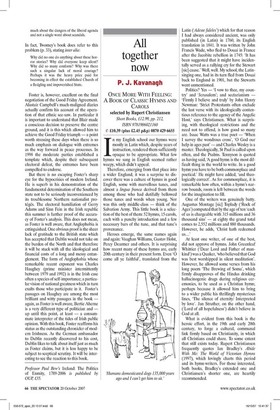All together now
P. J. Kavanagh ONCE MORE WITH FEELING: A BOOK OF CLASSIC HYMNS AND CAROLS selected by Rupert Christiansen Short Books, £12.99, pp. 212, ISBN 9781906021160 £10.39 (plus £2.45 p&p) 0870 429 6655 1 n my English school our hymns were mostly in Latin which, despite years of instruction, rendered them sufficiently opaque to be appropriate. What few hymns we sang in English seemed rather weepy, which didn't appeal.
Therefore, emerging from that place into a wider England, it was a surprise to discover there was a culture of hymns in good English, some with marvellous tunes, and almost a lingua franca derived from them among those who had dutifully bellowed those tunes and words when young. Nor was this only middle-class — think of the Salvation Army. This little book is a selection of the best of them: 52 hymns, 15 carols, each with a punchy introduction and a few necessary bars of the tune, and that tune's provenance.
Heroes emerge, the same names again and again: Vaughan Williams, Gustav Holst, Percy Dearmer and others. It is surprising how recent many of these hymns are, early 20th-century in their present form. Even '0 come all ye faithful', translated from the Latin (Adeste fideles') which for that reason I had always considered ancient, was only published (in Latin) in 1760, its English translation in 1841. It was written by John Francis Wade, who fled to Douai in France after the Jacobite rebellion in 1745: 'It has been suggested that it might have incidentally served as a rallying cry for the Stewart [sic] cause.' Well, well. My school, the Latinsinging one, had in its turn fled from Douai back to England in 1901, but the Stewarts went unmentioned.
Politics? Yes — 'I vow to thee, my country' and 'Jerusalem'; and sectarianism — 'Firmly I believe and truly' by John Henry Newman: 'Strict Protestants often exclude the last verse with its ideologically contentious reference to the agency of the Angelic Host,' says Christiansen. What is surprising, with theological restrictions and the need not to offend, is how good so many are. Isaac Watts was a true poet — 'When I survey the wondrous cross', '0 God our help in ages past' — and Charles Wesley is a master. Theologically, St Paul is called upon often, and the Psalms. Tennyson is quoted as having said, 'A good hymn is the most difficult thing in the world to write. In a good hymn you have to be both commonplace and poetical.' He might have added, 'and theologically correct'. As for commonplace, it is remarkable how often, within a hymn's narrow bounds, room is left between the words for the imagination to fill.
One of the writers was genuinely batty. Augustus Montage [sic] Toplady (Rock of Ages') computed that by the age of ten 'each of us is chargeable with 315 millions and 36 thousand sins' — at eighty the grand total comes to 2,552 millions and 880 thousands. However, he adds, 'Christ hath redeemed us...'
At least one writer, of one of the best, did not approve of hymns. John Greenleaf Whittier (Dear Lord and Father of mankind') was a Quaker, 'who believed that God was best worshipped in silent meditation'. However, he allowed some verses from his long poem 'The Brewing of Soma', which firmly disapproves of the Hindus drinking hallucinogenic drugs during religious ceremonies, to be used as a Christian hymn; perhaps because it allowed him to bring to a wider public his thrillingly mysterious lines, 'The silence of eternity/ Interpreted by love'. Jan Struther, on the other hand, (Lord of all hopefulness') didn't believe in God at all.
What is evident from this book is the heroic effort, in the 19th and early 20th century, to forge a cultural, communal link firmly based on Christianity, in which all Christians could share. To some extent that still exists today. Rupert Christiansen frequently quotes Ian Bradley's Abide With Me: The World of Victorian Hymns (1997), which lovingly charts this period and its hymn-writers. For those interested, both books, Bradley's extended one and Christiansen's shorter one, are heartily recommended.







































































 Previous page
Previous page